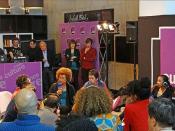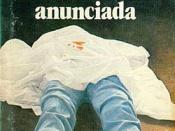Cultural differences can be quite astonishing. Languages, rituals, and gender roles can all vary greatly. However there are some constants to be found. It seems that, historically, women have been restricted by a double standard in societies around the globe. Those actions celebrated for men are extremely frowned upon for women. Young girls growing up also seem to have certain boundaries that simply donÃÂt exist for boys. Due to these facts it can be shocking when a young woman is forced to grow up unexpectedly because they are usually viewed as too fragile, too beautiful, too sheltered, or a combination of these. In each The Metamorphosis and Chronicle of a Death Foretold the weight of adulthood acts upon two young women, Grete Samsa and Angela Vicario with the same force.
In The Metamorphosis Grete is first seen as spoiled and somewhat lazy. When her older brother, Gregor, is already on his way to work he observes, ÃÂshe had probably just gotten out of bedÃÂ (Kafka 17).
Nothing is really expected from Grete. ThereÃÂs little schooling or household chores to speak of while she spends most of her days practicing her violin in the hopes of attending a conservatory. Grete leads her life in the restricted confines of her familyÃÂs apartment. Readers of this novel never hear of any friends, parties, or outings that would be normal for any other girl her age. Grete is sheltered by everyone in her family, even her older brother, who provides as much as he can and even wishes to surprise her with school tuition. Once her family life is turned upside down by GregorÃÂs transformation into a dung beetle, more responsibility is thrown upon her. With her familyÃÂs growing debt in the wake of GregorÃÂs unemployment she is forced to find a job, give up hopes of going to a specialized school, and act as a constant mediator between Gregor and her family causing her to seem ÃÂmore lively all the timeÃÂ (Kafka 52). Adult pressures are coming from all angles in GreteÃÂs new life and she can no longer regain the innocence she once possessed. Desperation drives most of GreteÃÂs decisions from this point on and desperate people tend to be harshest. Her position in adulthood is cemented when she has to make a choice between life and death. GreteÃÂs constant overload of tasks leaves her resentful towards Gregor, whom she is obligated to care for. When his health begins to fail she doesnÃÂt make any attempts to help him recuperate. Being the only person in the household willing to care for the creature she alone ushers Gregor into death. Reversing the path to childhood is now impossible, especially now that her parents have decided it ÃÂtime to find a good husband for herÃÂ (Kafka 52). Although the catalyst of change was beyond GreteÃÂs control, her decisions have earned her a permanent place in adulthood.
The beautiful Angela Vicario of Chronicle of a Death Foretold has been groomed into perfection, as viewed by her mother. Her life has been fairly sheltered in a small town in Colombia where she has also been well cared for by her parents and older brothers. AngelaÃÂs mother has thrown her entire being into caring for her daughters so AngelaÃÂs upbringing is enclosed within her family. When Bayardo San Roman, her foreign suitor, notes that she is ÃÂwell-namedÃÂ a series of events is set into motion (Marquez 31). As AngelaÃÂs brothers are virtually allowed free roam of the town she has to remain home learning the ways of life such as lace embroidery and caring for the elderly. In this society boys are seen as the light for the future while girls are supposed to become homebodies who will produce children. If a girl does not or cannot live up to these standards for any reason they will not be able to find a husband. Angela and her sisters must also apologize for the smallest infractions including brushing hair before bed or receiving gifts from male friends. This made it all the more shocking when her mother and father promise her hand in marriage to Bayardo. She is mystified as to why they made this decision considering she barely knows the man but, in her motherÃÂs words, ÃÂLove can be learnedÃÂ (Marquez 38). Another double standard of the society in which the man chooses a woman that embodies the perfect housewife and the woman is forbidden to raise any objections to the idea of marriage unless her parents believe it to be an unsuitable match. A true turning point in AngelaÃÂs life comes when she has to put on her wedding veil when she isnÃÂt ÃÂpureÃÂ even though her young unmarried friends have told her that many girls lose their virginities in childhood accidents. The placing of that veil truly sealed her fate because Bayardo immediately returned her when her indiscretions come to light. In this way it is shown that women are seen as objects, not people. The word ÃÂreturnedÃÂ is used to describe the giving back of something unsatisfactory and certainly shouldnÃÂt ever be applied to a human being. Once taken home Angela is promptly beaten by her mother for the dishonor she has thrust on the good name of the family. This beating is appropriate for the offense committed by societyÃÂs standard. Angela has brought shame upon her family by letting herself become impure before marriage. Throughout the thrashing she drifts in and out of consciousness but never wonders why this punishment is being thrown upon her because Angela fully understands her fault. Her retribution causes Angela to realize that she is no longer a child in any meaning of the word because while both a child and woman can be punished the child will be forgiven and the woman will forever carry a taint on her reputation.
Attitudes towards women can transcend all barriers whether it is age, race, or religion. Both young women feel the effects of a life altered. While GreteÃÂs brotherÃÂs change transforms her life as well, Angela being forced into marriage undid her childhood. Grete and Angela each suffer from either being too sheltered or the double standards of society even though they come from completely different worlds.
GarcÃÂa Márquez, Gabriel. Chronicle of a Death Foretold. Trans. Gregory Rabassa. New York: Ballantine Books, 1984.
Kafka, Franz. The Metamorphosis. Trans. Stanley Corngold. New York: Bantam Books, 1986.





